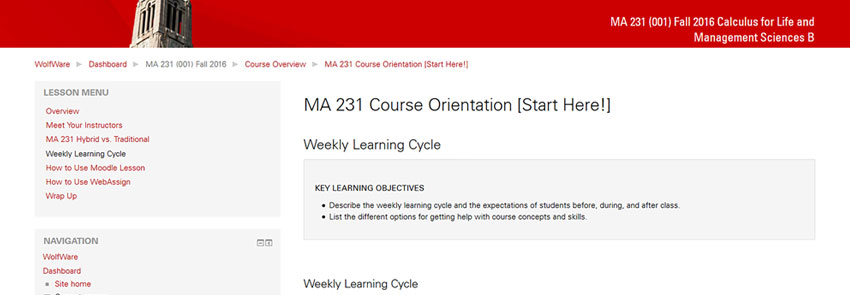
MA 231: Calculus for Life and Management Sciences
DELTA staff collaborated with Molly Fenn in redesigning MA 231: Calculus for Life and Management Sciences from a traditional lecture course with large sections into a hybrid course with small sections. Students complete online learning through self-paced Moodle Lessons which provide short lecture videos integrated with practice exercises. They also complete homework on WebAssign as an assessment of their online learning before coming to class. Students were encouraged to get individualized help through emails, discussion forums, tutoring centers or office hours during online learning. Students meet with the instructor or TA face-to-face for one session every week, during which they apply the math concepts and skills from online learning by solving application problems in small groups.
Instructional Challenges
MA 231 is created for non-math major students (biology, textiles, business). However, the traditional lecture version focuses more on drill math skills than applications, making it difficult for students to see the benefits for their own majors.
Since hybrid courses are still emerging on campus, most students are unfamiliar with this course format. They need to take the responsibility of completing online learning independently before coming to the face-to-face session.
Learning math concepts and skills online can be challenging for students due to the lack of direct interactions. They should actively seek individualized help when needed.
Highlights and Solutions
- Moodle Lessons: Weekly Moodle Lessons were developed to replace the original in-class lecture sessions. Students learn foundational math concepts and skills by watching short lecture videos and doing related exercises in a small-paced format. To simulate the in-class learning process, they are prompted to work on certain problems independently first and then watch the lecture video on how to solve them.
- Course Orientation: The course orientation was developed using the same Moodle Lesson template for online learning. It compares the traditional lecture version with the hybrid version, visually demonstrates the weekly learning cycle and expectations, and provides suggestions for using Moodle Lesson and WebAssign.
- Application Problem Example: An in-class application problem and guiding questions were developed as an example for active learning materials.
- Moodle Structure: The Moodle site was designed to present weekly online learning materials clearly and to encourage students to get individualized help online or in-person during hybrid learning.
Evaluation Findings
- Students in redesigned sections reported significantly higher levels of in-class readiness; higher comfort with math; more positive beliefs regarding how course skills apply to their major; and higher enjoyment learning how math fits into their math compared to traditional sections.
- Perceptions of the new course structure correlated positively with feelings regarding course learning outcomes and negatively with their help-seeking behavior.
- Overall use of online module learning material/structures declined and reported help-seeking behavior increased as the semester progressed.
- Redesign efforts were found to have a neutral to positive impact on final course grade distributions, and a positive impact on student DFW rates.
For more information about DELTA services, please contact LearnTech.